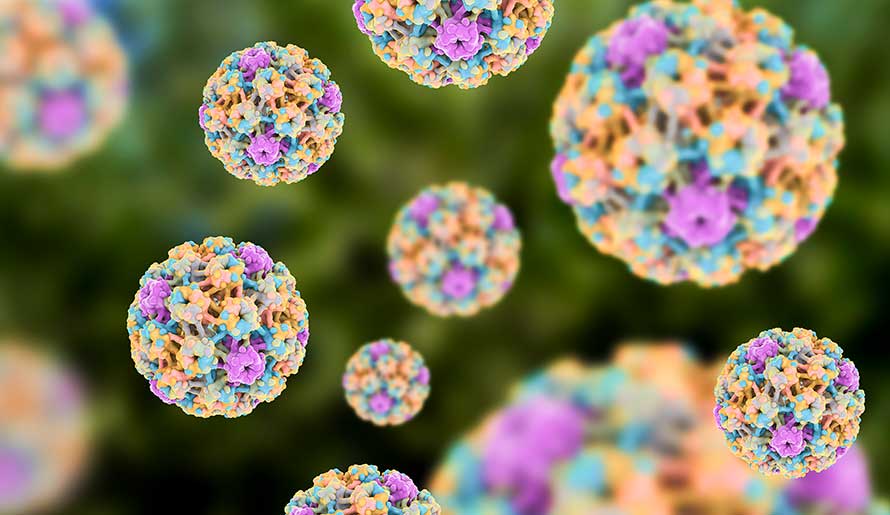Infection-Related Cancers

Infections cause approximately 20% of cancers worldwide; that’s nearly two million cancer cases each year. Many of these infections can be prevented with vaccines (e.g. human papillomavirus, hepatitis B) or treated with antiviral or antibacterial agents (e.g. direct-acting antivirals for hepatitis C), providing an opportunity to eliminate certain cancers (e.g. cervical cancer, hepatitis-related liver cancer).
The Center for Immunization and Infection Research in Cancer (CIIRC) is leading research to reduce the burden of cancer by addressing infection-related cancers. Research aims to elucidate the role of infectious agents in the etiology of cancer and translate this knowledge into novel and effective strategies for the prevention and treatment of cancer. Examples of some of the work being led by CIIRC faculty are below.
Hepatitis C Virus (HCV)
In the United States, liver cancer is one of the few cancers increasing in incidence, and infection with hepatitis C virus (HCV) has become the leading cause of liver cancer. HCV infections often go unnoticed until extensive damage has been done to the liver. Most (70-80%) of the people who get an HCV infection don’t experience any symptoms. Some people clear the infection on their own, but for more than 50% of people, the infection becomes chronic.
Direct-acting antivirals can now cure ~90-95% of people infected with HCV, thereby preventing the long-term damage and the development of cancer, but in order to be treated patients must know if they have an infection. CIIRC researchers are examining HCV testing rates and developing evidence-based methods to increase the number of people tested and connected to treatment. Through this work, and collaborations with researchers around the state of Florida, we aim to reverse the trends of increasing rates of liver cancer.
Human Immunodeficiency Virus (HIV)
People living with HIV are at a significantly higher risk of several types of cancer, including Kaposi sarcoma, certain types of non-Hodgkin lymphoma, cervical, anal, liver, and lung cancer. Moffitt is a clinical site of the NCI-supported AIDS Malignancy Consortium (AMC). AMC supports innovative trials for AIDS-related cancers and to study the pathobiology of malignancies of patients with HIV. As a clinical site, Moffitt can enroll patients to AMC studies, providing our patients with HIV and cancer updated therapies tailored specifically for this population. Through this work, we are also building a scientific understanding of the relationship between HIV and cancer.
Human Papillomavirus (HPV)
HPV is a group of related viruses. There are over 100 known types HPV, although some are much more common than others. HPV is spread through skin-to-skin contact. 90% of people clear their HPV infections within two years; however, some persist and can lead to precancerous lesions or even cancer. HPV can cause up to six different types of cancer among women and men: cervical, anal, vaginal, vulvar, penile, and oropharyngeal (a head and neck cancer that is in the tonsils, soft palate, and base of the tongue).
Scientists do not yet understand why some people are able to clear their infections and others do not, although research has shown that people who smoke or drink heavily are more likely to have infections that persist than people who do not.
There is no treatment for HPV but there are vaccines to prevent HPV infections, and evidence-based methods to screen for and treat precancerous lesions in the cervix. CIIRC faculty are working to reduce the burden of HPV-related cancers by improving rates of HPV vaccination, improving treatments for HPV-related cancers, and identifying biomarkers that can help diagnose HPV-related oropharyngeal cancer at early stages when it’s more easily treated. Additionally, Moffitt is leading the charge to eliminate HPV-related cancers, starting with cervical cancer, in Florida, across the U.S., and around the world.
